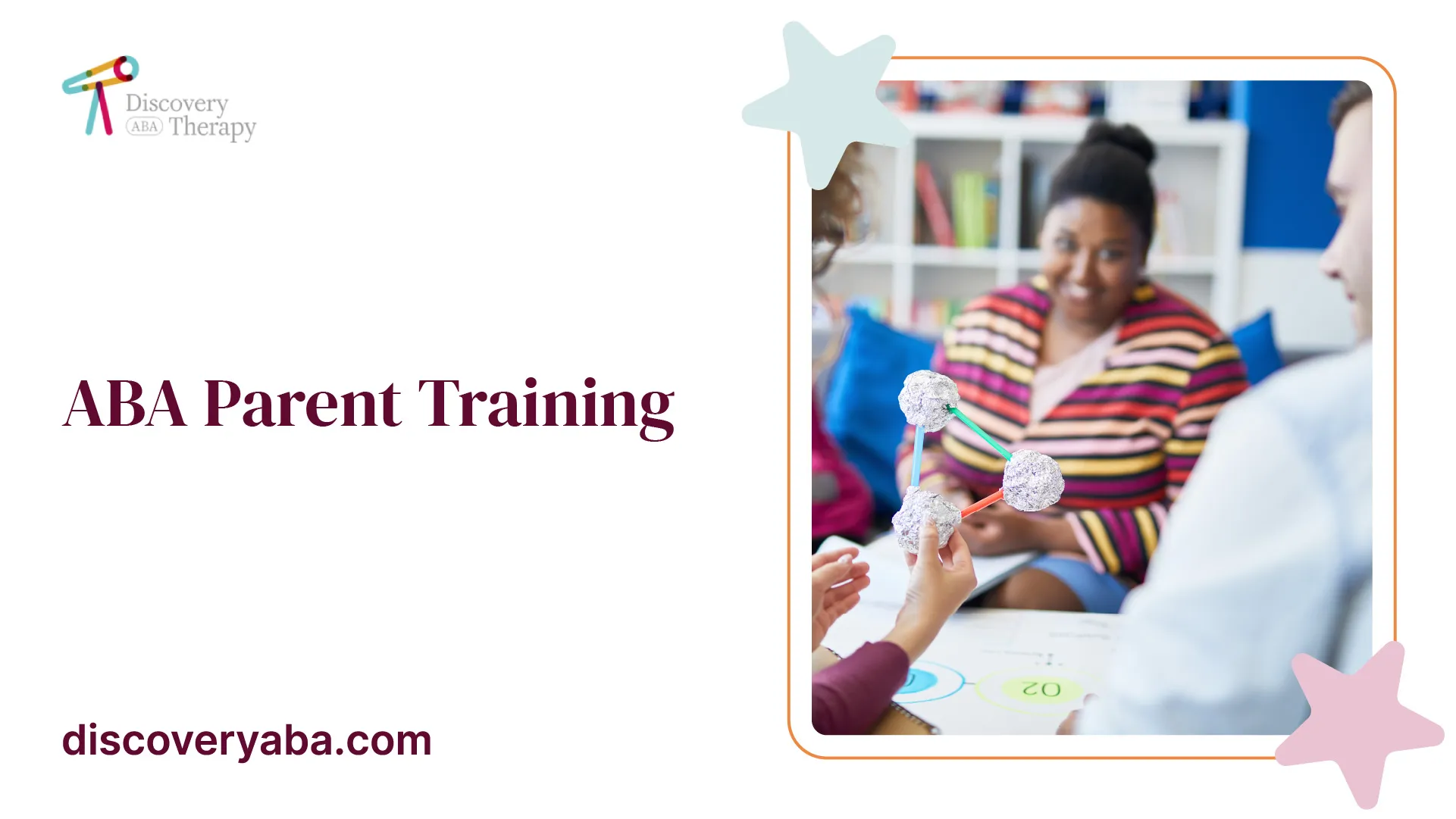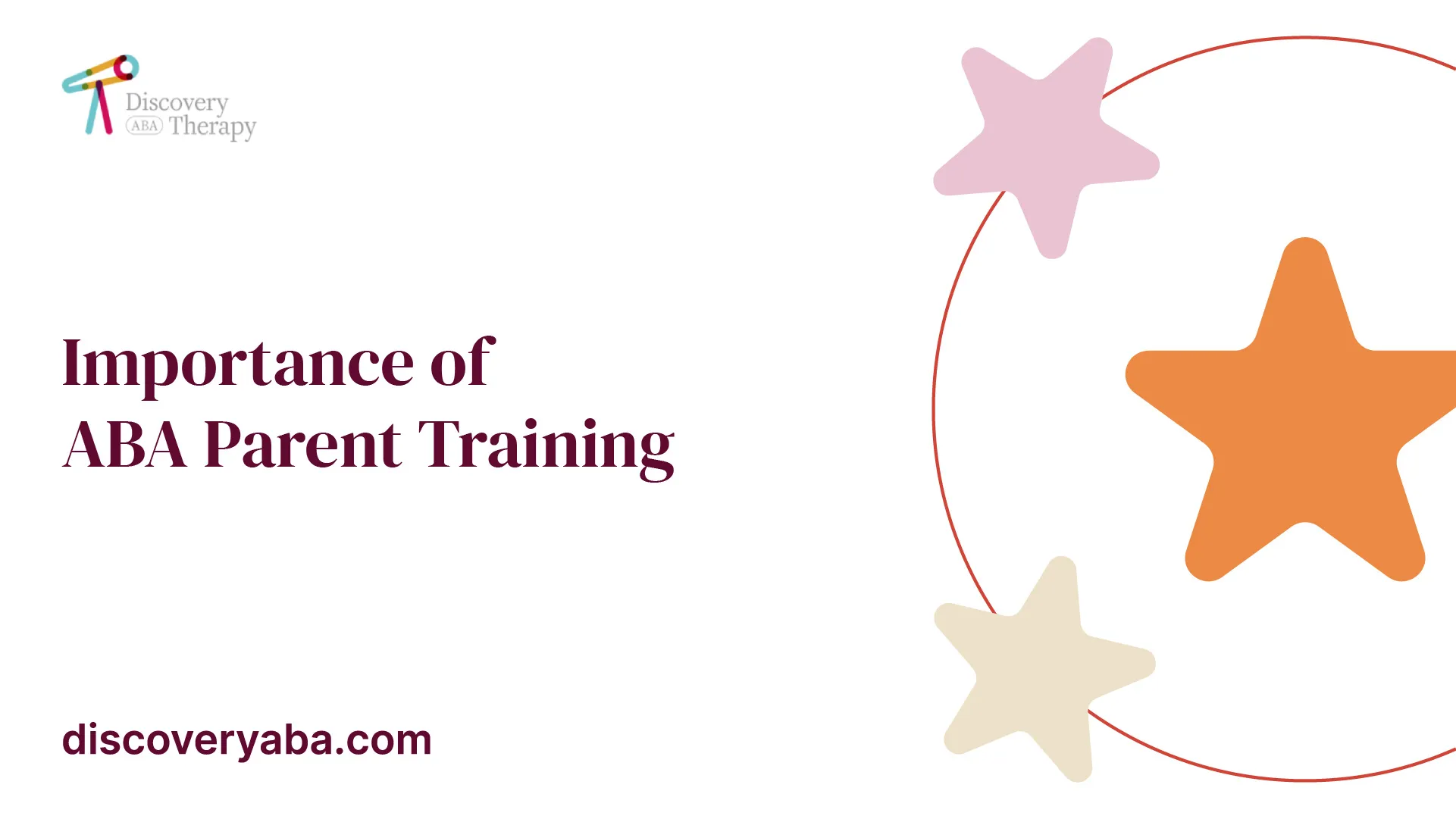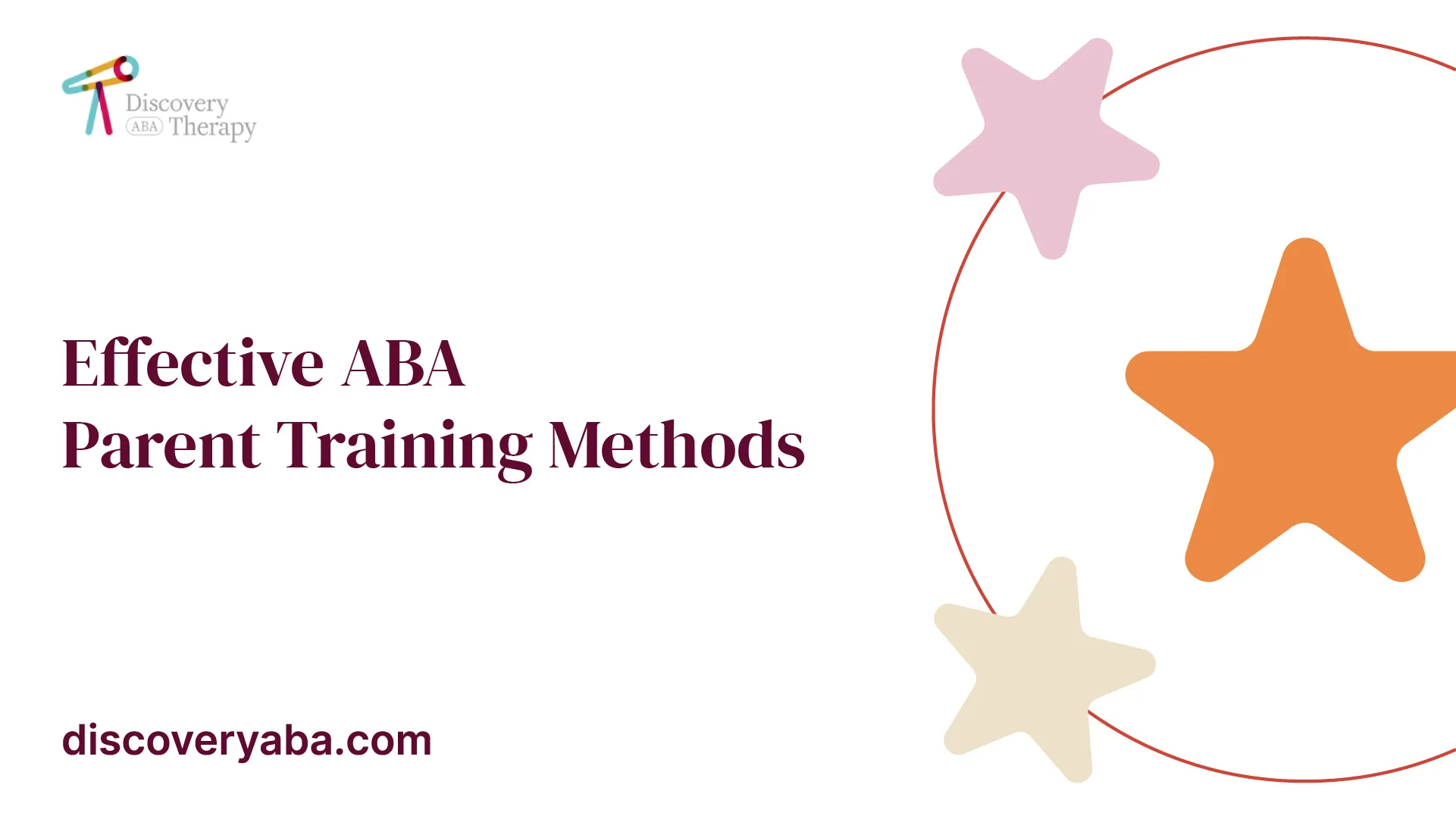ABA Parent Training
Unlock the power of ABA parent training for autism families. Enhance dynamics and treatment outcomes with essential strategies.


Importance of ABA Parent Training
ABA parent training plays a crucial role in the success of children with Autism Spectrum Disorder (ASD) and other behavioral challenges. It empowers parents to become active participants in their child's treatment plan, equipping them with the necessary skills and knowledge to support their child's development using evidence-based methods. ABA parent training has been shown to have numerous benefits, including enhancing family dynamics and improving child treatment outcomes.

Enhancing Family Dynamics
One of the significant benefits of ABA parent training is its positive impact on family dynamics. By participating in parent training, parents gain a deeper understanding of their child's needs and the strategies used in ABA therapy. This understanding fosters effective communication and collaboration between parents and therapists, creating a supportive environment for the child's development.
Quality parent training has been shown to reduce parental stress, improve family interactions, and strengthen the parent-child relationship. It equips parents with the tools and techniques to address challenging behaviors, promote positive reinforcement. By learning how to implement these strategies consistently, parents can create a structured and nurturing environment that supports their child's progress.
Link to Child Treatment Outcomes
Research has consistently shown that ABA parent training is linked to improved child treatment outcomes. When parents are actively involved in their child's therapy, they can reinforce the skills learned during therapy sessions and generalize them to real-life situations. This allows for a more comprehensive and holistic approach to treatment.
Parent training is not only about educating parents on ABA techniques but also about providing them with the necessary support. Studies have indicated that parent support, in addition to education, leads to better treatment results compared to education alone. The provision of support increases parent engagement in the therapeutic process, improves treatment integrity, enhances parenting skills, and reduces parenting stress [2]. By actively participating in their child's therapy, parents become advocates for their child's needs and play a critical role in their overall well-being.
The positive impact of ABA parent training extends beyond the immediate treatment period. Parents who receive training are equipped with lifelong skills that can continue to support their child's development. The ability to reinforce learned skills, implement behavior tracking techniques (aba behavior tracking), and apply generalization strategies (aba generalization strategies) ensures that the child's progress is sustained even outside of formal therapy sessions.
In summary, ABA parent training is an essential component of an ABA treatment plan. It empowers parents to actively participate in their child's therapy and promotes positive family dynamics. By providing parents with the necessary tools and support, ABA parent training contributes to improved treatment outcomes and the long-term success of children with autism and behavioral challenges.
Effective ABA Parent Training Methods

When it comes to ABA parent training, utilizing effective methods is crucial to ensure the best outcomes for both the child with autism and their family. Two key methods that have been proven to be effective are Behavior Skills Training (BST) and the role of parent support.
Behavior Skills Training (BST)
Behavior Skills Training (BST) is a highly effective method used to teach parents specific skills and programs, enabling them to actively participate in their child's ABA therapy journey. This method utilizes a step-by-step approach, including instruction, modeling, rehearsal, and feedback, to facilitate learning [2].
Through BST, parents learn how to implement various ABA techniques, such as prompting, reinforcement strategies, and behavior tracking. By providing clear instructions, demonstrating the desired behavior, giving parents an opportunity to practice, and providing constructive feedback, BST equips parents with the necessary skills to effectively support their child's development.
The Role of Parent Support
In addition to parent education, parent support plays a vital role in ensuring successful ABA parent training outcomes. Research has shown that incorporating parent support into ABA programs leads to better results compared to parent education alone [2].
Parent support involves providing parents with ongoing guidance, encouragement, and resources throughout the ABA therapy process. This support helps increase parent engagement in the therapeutic process, improves treatment integrity, enhances parenting skills, and reduces parenting stress [2]. Addressing parent stress is particularly important, as it can significantly impact the effectiveness of parent training. Understanding and addressing parent stressors, such as the child's characteristics and demandingness, is essential to ensure that parents can effectively implement ABA strategies with their child.
By combining effective training methods like BST with ongoing parent support, ABA therapists can empower parents to become active participants in their child's therapy journey. This collaboration between therapists and parents helps create a strong foundation for positive behavior change and maximizes the overall effectiveness of the ABA therapy program.
In the next section, we will explore the practical aspects of implementing ABA parent training, including utilizing software and collaborating with behavior analysts.
Implementing ABA Parent Training
Implementing ABA parent training is a crucial component of effective ABA therapy programs. It empowers parents to actively participate in their child's treatment and promotes consistent and generalized skill acquisition. Two important aspects of implementing ABA parent training are utilizing CentralReach software and fostering collaboration with behavior analysts.
Utilizing CentralReach Software
One valuable tool for implementing ABA parent training is CentralReach software. CentralReach offers clinical ABA data collection software that allows for the collection of data on both parent and child behavior. This software enables the analysis of progress through auto-generated graphs, providing a visual representation of the child's development. By using CentralReach software, parent training becomes more sustainable and visible, particularly for remote staff and supervisors.
In addition, CentralReach's Avail tool provides parents with easy access to video-based instructions and models of skills they need to use with their children. This feature enhances parent training by offering visual demonstrations that can be more accessible and comprehensible than written directions, especially when delivered remotely.
Behavior Analyst Collaboration
Collaboration between behavior analysts and parents is vital in ensuring the success of ABA parent training. Behavior analysts play a crucial role in guiding parents through the training process and providing the necessary support and expertise. They work closely with parents to develop an individualized training plan that aligns with the child's specific needs and goals.
Behavior analysts can also offer ongoing feedback and guidance to parents, helping them refine their skills and reinforce positive behaviors effectively. This collaboration ensures that parents feel supported and equipped with the knowledge and tools to implement ABA strategies consistently.
It is important to note that parent training goals are typically included in treatment plans, and they are frequently provided by board-certified behavior analysts (BCBAs) or under their supervision by BCaBAs. Insurance companies often require parent training, and while non-certified staff may be allowed to provide it in some cases, proper training and supervision are crucial for its effectiveness.
By utilizing CentralReach software and fostering collaboration with behavior analysts, ABA parent training can be implemented more effectively. This approach ensures that parents have the necessary tools, support, and resources to promote their child's progress and success in the ABA therapy program.
Benefits of ABA Parent Coaching
When it comes to ABA therapy, parent coaching plays a vital role in empowering families and promoting positive outcomes for children with autism. ABA parent coaching involves training parents in ABA principles and procedures, equipping them with the necessary tools to support their child's development. Let's explore two key benefits of ABA parent coaching: positive behavior reinforcement and goal setting and focus.
Positive Behavior Reinforcement
A crucial aspect of ABA parent coaching is teaching parents how to reinforce positive behaviors effectively. This involves shifting the focus from negative behaviors to positive ones and coaching parents on reinforcement strategies. By reinforcing desired behaviors, parents can create a supportive environment that encourages their child's progress and motivates them to engage in appropriate behaviors.
Through ABA parent coaching, parents learn to identify and reinforce positive behaviors promptly and consistently. This reinforcement can take various forms, such as verbal praise, tokens, or rewards that hold value for the child. By consistently reinforcing positive behaviors, parents can help their child generalize these behaviors beyond therapy sessions and into everyday life. To learn more about reinforcement methods, visit our article on ABA reinforcement methods.
Goal Setting and Focus
Another key benefit of ABA parent coaching is the emphasis on goal setting and focus. A successful coaching strategy involves working with parents to prioritize specific goals for their child's development [5]. By selecting one goal at a time, parents can focus their efforts and avoid feeling overwhelmed by an extensive list of objectives. This approach allows parents to provide targeted support and track progress more effectively.
By setting clear goals, parents can collaborate with the therapy team to create a consistent and structured environment that supports their child's growth. Through ABA parent coaching, parents learn strategies to implement during daily routines and interactions to reinforce targeted skills and behaviors. This focused approach helps parents maintain their child's engagement and progress in achieving developmental milestones. For more information on skill acquisition, refer to our article on ABA skill acquisition.
By participating in ABA parent coaching, families can experience the transformative power of ABA therapy firsthand. Through positive behavior reinforcement and goal setting, parents become active partners in their child's treatment journey, fostering a supportive and nurturing environment for their child's growth. If you're interested in learning more about ABA therapy best practices and professional development, explore our articles on ABA therapy best practices and ABA professional development.
Strategies for Successful ABA Parent Training
To ensure the success of ABA parent training, it is crucial to implement effective strategies that empower parents to support their child's progress. Two key strategies for successful ABA parent training include role-playing and practice, as well as providing feedback and support.
Role-Playing and Practice
One of the most effective ways for parents to acquire and master ABA techniques is through role-playing and practice. By creating opportunities for parents to actively engage in simulated scenarios, they can practice implementing ABA strategies in a controlled environment. This hands-on approach allows parents to gain confidence and build their skills in applying ABA principles to real-life situations.
During role-playing exercises, parents can practice using ABA reinforcement methods. This process helps parents develop a deeper understanding of how to use positive reinforcement effectively and identify the antecedents and consequences that impact behavior.
Feedback and Support
Providing feedback and support is essential for parents undergoing ABA parent training. Regular and constructive feedback helps parents refine their implementation of ABA techniques and make necessary adjustments. Behavior analysts or ABA professionals play a crucial role in providing feedback, guiding parents in fine-tuning their approach, and addressing any challenges that may arise.
Support is also important to ensure parents feel encouraged and motivated throughout the training process. A supportive environment allows parents to openly discuss their experiences, ask questions, and seek guidance. ABA professionals can offer reassurance, answer queries, and provide resources that further enhance parents' understanding of ABA therapy best practices [6].
By combining role-playing and practice with feedback and support, ABA parent training becomes a comprehensive and empowering experience. It equips parents with the necessary skills and knowledge to effectively implement ABA techniques in their everyday interactions with their child.
It's important to note that effective ABA parent training is an ongoing process. Parents should continue to receive guidance and professional development opportunities (aba professional development) to deepen their understanding of ABA principles and refine their implementation skills. Regular communication and collaboration between parents and behavior analysts are vital for continued growth and success.
Remember, ABA parent training is not only about addressing challenging behaviors but also about nurturing positive behavior reinforcement (aba skill acquisition), setting goals, and focusing on the individual needs and strengths of the child. By utilizing strategies like role-playing, practice, feedback, and support, ABA parent training can empower families and make a significant impact on the overall progress and well-being of the child with autism.
Impact of Parent Involvement
In the realm of ABA therapy, the involvement of parents plays a pivotal role in the success of the treatment. Parent involvement is key to implementing a family-centered treatment model and promoting the generalization of skills learned during therapy sessions.
Family-Centered Treatment Model
Utilizing a family-centered treatment model, ABA therapy recognizes the importance of involving parents in the intervention process. This approach acknowledges that parents are a consistent and influential part of a child's environment and can greatly contribute to their growth and potential achievement. By actively involving parents in the therapy process, it becomes possible to enhance the child's progress and ensure that learned skills are practiced and reinforced in various settings.
Through parent training in ABA therapy, parents are empowered with the knowledge and skills to support their children's development and apply learned skills across different situations and environments. This collaborative approach not only strengthens the parent-child bond but also instills confidence in parents as they become active participants in their child's therapy journey. For more information on ABA therapy best practices, visit our article on ABA therapy best practices.
Promoting Generalization of Skills
One of the significant benefits of parent involvement in ABA therapy is the promotion of generalization of skills. Generalization refers to the ability to apply learned skills in new and diverse situations. With parents actively participating in the therapy process, they can help their children practice and reinforce skills in real-life scenarios outside of therapy sessions. This allows the child to transfer and apply the acquired skills across different environments, ensuring that progress is sustained over time [8].
By promoting generalization of skills, parents become an integral part of the child's therapy team. They work in collaboration with behavior analysts to identify opportunities for skill application in everyday activities and routines. This process not only helps the child to generalize skills but also strengthens the child-parent relationship and facilitates a smoother transition from therapy to daily life.
The involvement of parents in ABA therapy has been shown to have numerous positive outcomes, including improvements in language comprehension, communication skills, and a reduction in disruptive behaviors associated with Autism Spectrum Disorder (ASD) [9]. Parent training interventions are also effective in increasing parental confidence and reducing parental stress.
By actively involving parents in the treatment process, ABA therapy maximizes its potential to create lasting positive change in the lives of individuals with autism. Through the family-centered treatment model and the promotion of skill generalization, parents become essential partners in their child's journey towards growth and development.
References
Does Your Child Have An Autism Diagnosis?
Learn More About How ABA Therapy Can Help
Find More Articles
Contact us
North Carolina, Nevada, Utah, Virginia
New Hampshire, Maine
Arizona, Colorado, Georgia, New Mexico, Oklahoma, Texas
.avif)




































































































